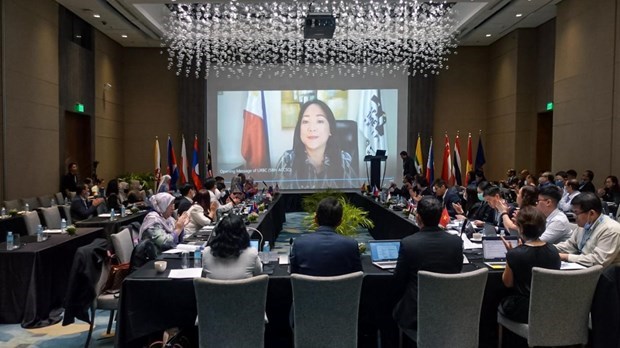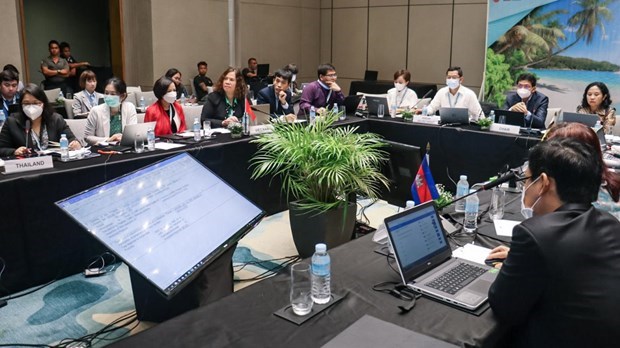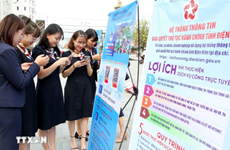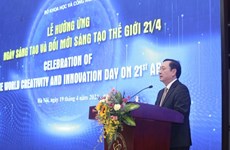Harmonized standards can promote ASEAN digital commerce
 (The 58th meeting of the ASEAN Advisory Committee on Standards and Quality (ACCSQ) (Photo: Vietnam+)
(The 58th meeting of the ASEAN Advisory Committee on Standards and Quality (ACCSQ) (Photo: Vietnam+)The Organization for Economic Co-operation and Development (OECD) estimates among countries in the Association of Southeast Asian Nations (ASEAN), a 10% increase in Internet usage could increase trade in goods by 3.4% and trade in services by 3.9%.
Meanwhile, the Southeast Asia 2022 economic report by Google, Temasek & Bain shows that the total number of ASEAN Internet users has increased by about 20 million people from 440 million in 2021 to 460 million in 2022. The ASEAN Internet economy will grow by about 20% from 161 billion USD in 2021 to 194 billion USD in 2022.
It is estimated that the size of the ASEAN economy has nearly doubled in the 3-year period from 2019 to 2022. It can be said that with the potential of a dynamic development region, young population, easy access to technology, with the number of internet users growing rapidly, ASEAN has a lot of potential to significantly enhance digital commerce.
In the context of rapidly growing digital trade, to take advantage of digital trade, ASEAN needs to approach and solve policy and interoperability issues to enhance trade from a regional perspective.
Accordingly, ASEAN needs common standards in the field of digital trade. Conformity and harmonization of standards will help ASEAN businesses easily access regional and global markets, ensure the smoothness of trade and help businesses improve their reputation and brand when participating in the global market.
In this context, the ASEAN Digital Trade Standards Working Group (DTSCWG) was established, under the ASEAN Advisory Committee on Standards and Quality (ACCSQ). DTSCWG was established with the aim of promoting harmonization, standardization and conformity assessment of digital trade in ASEAN.
The Department of E-commerce and Digital Economy (Ministry of Industry and Trade) is Vietnam's focal point in this Working Group on Standards on Digital Commerce.
DTSCWG's responsibilities include: Harmonizing standards among ASEAN member countries based on international standards, guidelines and practices; Coordinating with relevant stakeholders and other specialized ASEAN bodies to cooperate on standards, technical regulations and conformity assessment procedures related to e-commerce/digital commerce; Engaging with FTA Partners, Dialogue Partners and other regional and international organizations related to Standards and Conformity (STRACAP) on e-commerce/digital commerce.
Within the framework of the DTSCWG Work Program, activities on overall research on e-invoice standards have been carried out by Singapore. The development of a set of guidelines for information dissemination on digital trade standards has been carried out by Vietnam. Activities to improve capacity and disseminate knowledge about digital trade standards have also been implemented by DTSCWG in 2022.
 The 58th meeting of the ASEAN Advisory Committee on Standards and Quality. (Photo: Vietnam+)
The 58th meeting of the ASEAN Advisory Committee on Standards and Quality. (Photo: Vietnam+)At the 58th meeting of the ASEAN Advisory Committee on Standards and Quality (ACCSQ), the Standards Group on Digital Trade in ASEAN reported on activities in 2022 and discussed activities in the coming period.
The DTSCWG will coordinate with ASEAN partners such as Australia, the UK and the US to conduct research, policy consulting, and capacity building activities to help disseminate knowledge about digital trade standards in the businesses community and help ASEAN businesses easily access, comply and effectively apply digital trade standards in their production and business activities.
In the coming time, ASEAN will focus on implementing the Digital Trade Standards Work Program to contribute to making ASEAN a leading region in the digital economy./.












